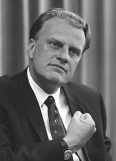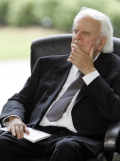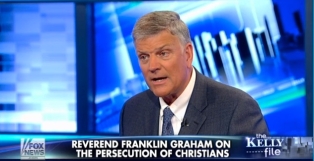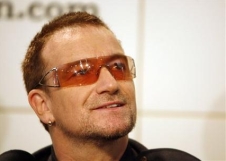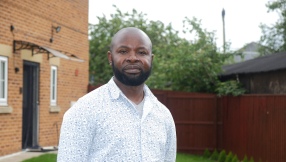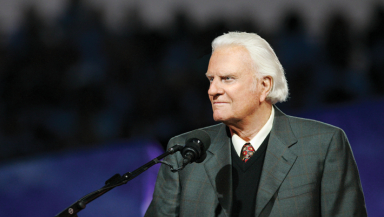
Billy Graham was born on a dairy farm in Charlotte, North Carolina on November 7, 1918, as the First World War was drawing to a close. His family were Christians but he made a personal commitment at the age of 15 through the ministry of Mordecai Ham, a travelling evangelist who had visited Charlotte for a series of revival meetings.
Graham was ordained in 1939 by a church belonging to the Southern Baptist Convention, attending the Florida Bible Institute and Wheaton College. He graduated from Wheaton in 1943 and married Ruth McCue Bell, whose father was a missionary surgeon and who spent the first 17 years of her life in China and Korea.
Graham became the pastor of First Baptist Church in Western Springs, Illinois, before joining Youth for Christ. Through YFC he preached all over Europe and the US in the post-war years.
Physically impressive and a spellbinding orator, he came to national prominence in 1949 with his Los Angeles Crusade, in which he came to the attention of newspaper magnate William Randolph Hearst, who famously sent a two-word telegram to all his editors saying "Puff Graham". His sons later said that they believed their father had been present in the audience in his wheelchair anonymously.
Whatever help he have unwittingly had, the Los Angeles Crusade, scheduled for three weeks, was to run for eight. Among those who responded to the appeals was war hero Louis Zamperini, whose life story was made into a film by Angelina Jolie.
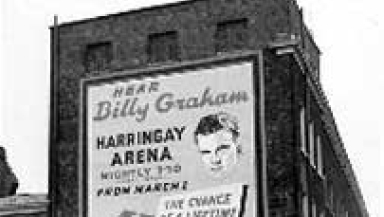
In 1954 he came to England for the Harringay Crusade, which has been described as the closest England ever came to mass revival. It was estimated that 2 million people attended the rallies in the 15,000-seat arena. Scheduled to last for four weeks, the run was extended to three months.
During the following years Graham, through the Billy Graham Evangelistic Association, developed a highly professional but spiritually grounded methodology which saw him preach the gospel to nearly 215 million people in more than 185 countries and territories. He was also an innovator, using modern means of technology to reach hundreds of millions more through TV and radio broadcasts and through printed material.
He was a pioneering Civil Rights supporter during the dark days of segregation in America, personally tearing down the rope that separated black and white members of an audience in 1953. He once told a white audience, "We have been proud and thought we were better than any other race, any other people. Ladies and gentlemen, we are going to stumble into hell because of our pride." He was a friend of Martin Luther King, though the two disagreed sharply about America's foreign policy and particularly over the Vietnam War; Graham was a fervent anti-communist.
In politics Graham tended towards the right, though he avoided explicit endorsements of individuals or parts. He knew every president personally since Truman and had close friendships with some, including Lyndon B Johnson and Nixon. He was bitterly disappointed in Nixon as a result of the Watergate scandal.
Graham was known as 'America's pastor' because of the respect he had engendered among the political establishment and his evident integrity and sincerity.
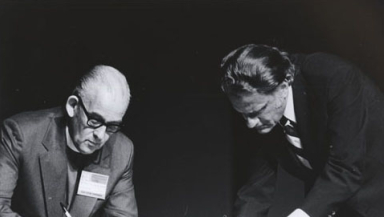
One of the initiatives in which he was involved that bore the most lasting fruit was the Lausanne Movement, of which he was the founder. It brought together 2,700 participants from 150 nations in Lausanne, Switzerland in 1974 to engage with the question of how to relate evangelical Christianity to the modern world.
The Lausanne Movement remains a significant force today and is credited with shifting evangelicals back to a concern for the poor and marginalised alongside a concern for souls.
Graham has preached in both North and South Korea as well as many other countries. He received a star on the Hollywood Walk of Fame in 1989, addressed 250,000 people in New York's Central Park and in 1998 spoke at a TED conference to scientists and philosophers.
Graham faced criticisms from fundamentalists for appearing on platforms with Roman Catholics and other non-evangelicals. However, while personally conservative theologically, he lacked the hard edge and aggressive attitude of many of those who shared his convictions.
He said in an interview with Robert Schuller: 'I think that everybody that loves or knows Christ, whether they are conscious of it or not, they are members of the body of Christ... [God] is calling people out of the world for his name, whether they come from the Muslim world, or the Buddhist world or the non-believing world, they are members of the Body of Christ because they have been called by God. They may not know the name of Jesus but they know in their hearts that they need something they do not have, and they turn to the only light they have, and I think that they are saved and they are going to be with us in heaven."'
Graham and his wife Ruth had five children, Gigi, Anne, Ruth, Franklin and Ned. They were married for 65 years and she died in 2007. He had become increasingly frail in his later years and suffered from illnesses including Parkinson's disease.
He was the most honoured and effective evangelist of the 20th century.










